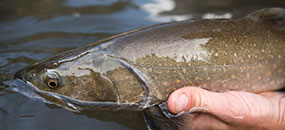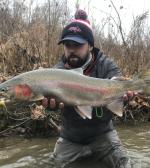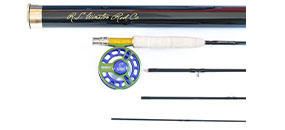Fishing can be a serene and peaceful way to enjoy nature's beauty. Until you hurt yourself.
By Mark Taylor
I checked in with the folks last night and the talk soon turned to fishing.
I’ll be making the trip from Virginia to Oregon to see them in a couple of weeks. Dad said there should be plenty of steelhead in the home river. He caught his first of the season the other day.
“You’ve got an extra float rod for me, right?” I asked.
Silence.
“What about your fly rod?” he finally asked. “That’s what you caught all of your fish on last winter, right?”
It was my turn to pause.
“I’m not sure I will be able to cast the fly rod. I’m hurt.”
Me being hurt is nothing new. I do a lot of mountain biking, for fun and as a volunteer adult leader with a local youth team. I hit the ground frequently.
The more years that pass, the harder it is to bounce back from mountain bike crashes. “We’ve lost our Gumby juice,” an also-aging friend likes to say.
But this isn’t a mountain biking injury. It’s a fishing injury.
When you get hurt fishing and struggle to bounce back?
Well, that can be a pretty sure signal that you’re on the downward slope of life.
Getting hurt fishing in itself is not that unusual.
Probably the most common way to do that is to get impaled by a hook. My best one of those came during a steelhead trip a dozen or so years ago.
A bad backcast on a windy day resulted in an egg fly buried deep into the side of my nose. It hurt like hell. One of my fishing companions tried to comfort me by saying I was fortunate that my large nose had protected the rest of my face.
I did the trick of putting pressure on the shank and yanking from the bend and the hook popped out. There were tears, but I maintain they were due to the sensitive location of the wound.
Wading can also be hazardous, and is one of the things that seems to get more treacherous with each passing year.
As a young buck, getting wet is often the worst thing about a wading slip or trip.
Now? Painful bruises at best and broken bones at worst.
Hit 50 (or so) and wading staffs become as an essential piece of gear as rods and reels.
So this one? Not very sexy.
In early December a few TU friends and I spent a couple days chasing steelhead (yes, there is a pattern here) in Great Lakes tributaries.
We fished pretty hard and I spent long hours chucking a meaty indicator rig with a switch rod.
By the end of the trip, every time I cast it felt like someone was smashing my elbow with a hammer.
I had developed lateral epicondylitis, aka tennis (or fishing) elbow.
This is a common problem and one that’s often pretty easily treatable.
Initial treatment usually consists of rest, ice and over-the-counter pain meds and anti-inflammatories.
Unfortunately in this case rest means avoiding activities such as casting beefy indicator rigs with a switch rod.
The elbow is better, but not great. I’ll still take the rod out on my trip and I’ll probably give it a try as I’m actually not terrible at casting left-handed. But I’ll want that spinning rod as a back up.
Eventually this malady will pass. But others are sure to follow.
Getting older as an angler isn't fun. But, as the saying goes, it's better than the alternative.
Mark Taylor is Trout Unlimited's eastern communications director. He lives in Roanoke, Va., which is not only the East Coast's Mountain Biking Capital, but also in the heart of Appalachian brook trout country.





